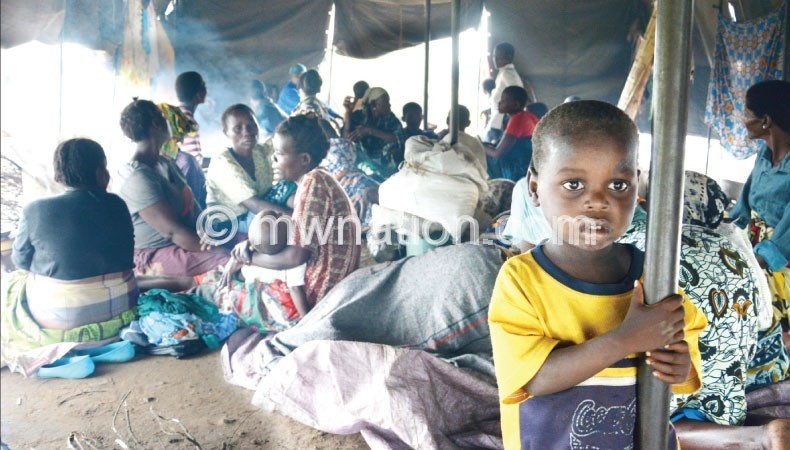Flood victims’ cry
Geoffina Gilisoni, 90, of Kutulo 1 Village, Traditional Authority (T/A) Lundu in Chikwawa, curses the night raging waters hounded her family, forcing her and her grandchildren to seek refuge at Sammy’s Camp for flood victims.
The refuge Gilisoni and her grandchildren got was not what they expected when they eagerly accepted to be ferried to the camp by aid workers.
 She reveals that in the camp, they are rarely supplied with adequate basic necessities, especially foodstuffs and toiletries to enable them to live healthy lives.
She reveals that in the camp, they are rarely supplied with adequate basic necessities, especially foodstuffs and toiletries to enable them to live healthy lives.
“Every day, we hear reports of organisations donating relief items to the disaster response. But how come we are being starved here?” says the seemingly hungry and frail Gilisoni.
She adds: “We’ll surely die of hunger if government does not intervene”
The Department of Disaster Management Affairs (Dodma) says over 640 000 people have been affected in Malawi’s 15 districts since early January, with 176 dead and hundreds more injured or missing.
As a result, President Peter Mutharika declared the 15 districts a disaster zone, thereby attracting both local and international organisations to contribute financial and material resources to government and humanitarian actors in response to what has been termed ‘the worst flooding in the country’s history’.
Since then, a day hardly passes by without an organisation donating to flood victims.
National Initiative for Civic Education (Nice) Trust regional civic education officer, EnockChinkhuntha, says although no camper has come out to report witnessing theft of aid [for flood victims], it is imperative for government to ensure the donations reach the rightful beneficiaries.
Says Chinkhuntha: “We don’t want a situation where victims would be suffering because someone is abusing the resources.”
He says his organisation has also received reports of chiefs tampering with lists of beneficiaries to include their ‘undeserving’ relatives and cronies.
While commending government for ensuring proper coordination of the relief aid, Chinkhuntha says there is need to investigate these reports and bring to book the culprits because their ‘actions have potential to demotivate the donor community’.
But district commissioner for (DC) Chikwawa, Alex Mdooko, dismissed the claims of mismanagement of relief items as baseless.
“What you need to know is that these people rarely appreciate efforts other people are undertaking to serve and save them,” he says.
But Gilisoni maintains her stand, and insists government needs to investigate to get to the bottom of the issue.
“If government does not want us to starve to death, then it must protect us from those taking advantage of the distaster to enrich themselves,” she implores.
The Asian Muslim Relief Aid (Amra) is one of the organisations that have been providing assistance to flood victims in Phalombe, Mangochi, Chikwawa and Nsanje districts in partnership with the United Kingdom (UK)-based Drop of Compassion and Polokwane Muslim Welfare Trust (South Africa).
Amra provided each household with a hamper containing a 2kg pack of maize seed, 25 water purification sachets (Waterguard), one blanket, crockery and utensil set consisting of 14 seven plates, seven mugs, seven spoons, a book, two packets of soya pieces, one mosquito net, one plastic bucket, one plastic basin and K2 000 cash.
Each hamper is worth K20 000, according to Amra volunteer AmiirJakhura.
Jakhura says unlike other organisations, Amra and its partners do not involve aid workers or government authorities in the distribution of relief items. He says this method has helped them reach out to the deserving beneficiaries with their support.
Jakhura explains: “Our previous experience taught us that some people take advantage of disasters such as these to reap where they didn’t sow. We, therefore, decided to distribute the items on our own to ensure it is only the deserving persons getting the assistance.”





